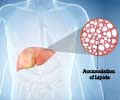Adults with higher levels of phosphate in the blood are at an increased risk of developing atherosclerosis or ’hardening of the arteries’, says a new study.
The research team led by Dr Robert N. Foley, of University of Minnesota and the US Renal Data System (USRDS), both in Minneapolis, MN, found that adults with higher levels of phosphate in the blood are likely to have increased levels of calcium in the coronary arteries-a key indicator of atherosclerosis and future cardiovascular disease risk."Phosphate level may represent a previously unidentified and modifiable cardiovascular risk factor, and could help identify people for whom modifiable risk factors could be screened and managed," said Foley.
During the study, the researchers analysed the relationship between phosphate level and coronary artery calcium in 3,015 healthy young adults.
At an average age of 25 years, the subjects underwent measurement of their serum phosphate level. The phosphate level reflects the mineral phosphorus, which plays an important role in bone metabolism.
A special computed tomography (CT) scan was used 15 years later to measure the level of calcium in the coronary arteries. Coronary artery calcium is an early sign of atherosclerosis, or "hardening of the arteries."
The researchers found that subjects with higher phosphate levels were about 50 percent more likely to be at the highest level of coronary artery calcium, compared to those with lower phosphate levels.
Advertisement
If higher phosphate levels play a role in causing cardiovascular disease, then a link between phosphate level and early atherosclerosis might be found even in healthy people without kidney disease.
Advertisement
Source-ANI
SRM















